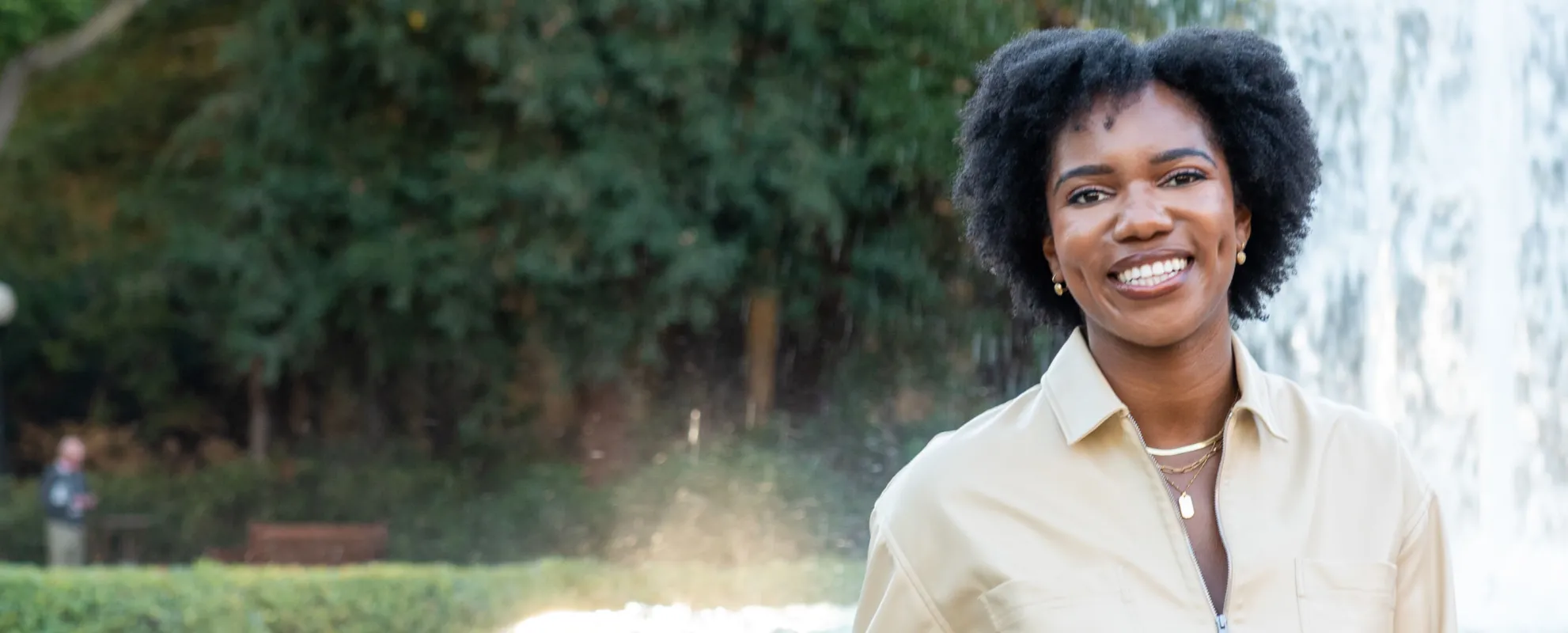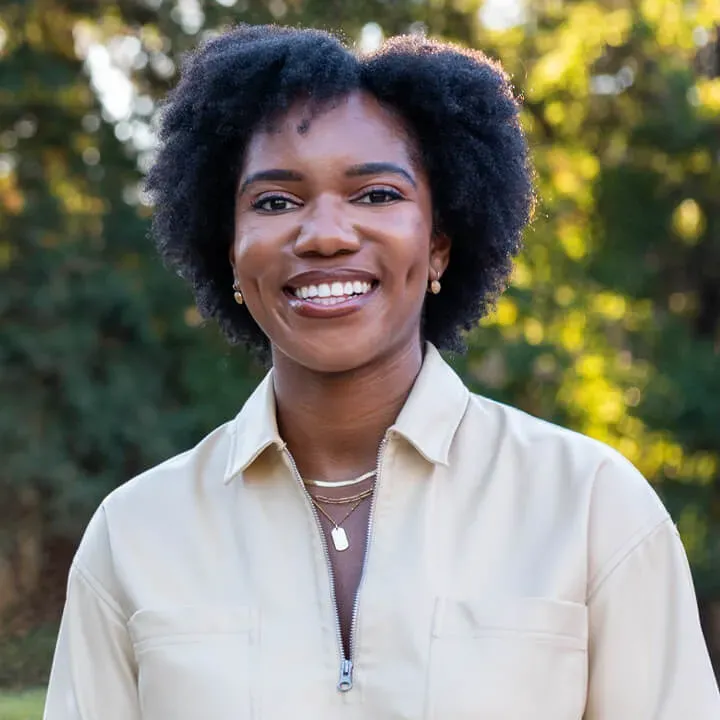In her admissions essay to Stanford GSB, Melanie Okuneye described her vision for connecting investors and stars from the worlds of music, entertainment, and sports with Black and other marginalized entrepreneurs. The Nigerian native, who grew up in London, wanted to help those entrepreneurs find a broader market for their products. The essay was inspired by her eclectic background as a former investor at Goldman Sachs, an athlete, and a stage performer.
“When I was performing, even at my best I never had the goal of becoming the next Beyoncé, because that happens once in a blue moon,” Okuneye says. “So I wrote about how I could have an impact.” Specifically, she imagined building a solid business infrastructure around African musicians so that the artists could focus on creating the kind of music she remembers from her childhood among Nigerian ex-pats in London.
So when her acceptance letter arrived from the GSB, Okuneye was touched by the encouraging personalized note that was included from the admissions director. It was clear that Stanford had seen and heard her. “Having a huge institution like Stanford say they believed in my vision, that was crazy to me. Previously, I felt a lot of pressure to do something conventional. For someone else to say ‘I’ve got you; you can do this,’ was really empowering. It really gave me the kick-start I needed. My aspirations have evolved over time, but that sense of empowerment remains.”
You majored in philosophy, politics, and economics as an undergrad. What advantages do you feel that gave you as you moved forward into your career?
Everything is rooted in some sort of philosophy. Studying PPE shows you how the world around us works, the interconnectedness of things, what power is like in society. Economics is about how to change dynamics, how wealth can be redistributed, how to understand the different stakeholders. Altogether it was a well-rounded approach to problem-solving and interacting with the world.
What lessons did you take away from your nearly five years at Goldman?
Working at Goldman showed me the importance of consistently working on my physical and mental well-being. I have become a huge advocate of mental health care, as a result. At Stanford, I have built an organization focused on improving access to mental health care for Africans in Africa and the diaspora, given the crucial need but lack of resources.
Goldman also taught me to say yes to new opportunities, trusting that the people you say yes to will create the right opportunities for you; to learn to be open with myself and to be open to unusual paths that present themselves; and to appreciate the importance of relationships. Also, I learned that you find your tribe wherever you go, especially as a Black professional. Those networks stay strong long after you’re done being an analyst.
Any particular challenges you faced as a woman of color in the world of private wealth management?
Thousands, for sure. Part of it is internal, and part of it is external. It’s that feeling that you’re out of place in the room when you walk in. As a Black woman, there were remarks about my hair, about what I wore to work. You’re constantly on. At the end of the day, I remembered what my dad told me when I went to boarding school where I was the only Black person in class. He said, “No matter what, you’re going to be remembered. So it’s up to you whether you’ll be remembered for good or bad. That power is in your hands.”
Describe the power you feel at this point in your career, and how you’re using it.
I have an opportunity to create opportunities for others. There was a lot of power in the position I had, even though it was hard. I want to be remembered for using the position to have high influence and impact. My identity may have held me back in some ways, but once I navigated those processes I wanted to create opportunities for others to navigate those processes as well. That’s why I’m so motivated to help others that look like me fulfill their full potential via better mental well-being, which can lead to better outcomes in their career and personal lives.
You are a classically trained musician, but you’re passionate about promoting African music.
I grew up in London, which has a majority immigrant population, and grew up with a strong sense of my heritage. I felt it through my community, through the food I ate and the clothing I wore. So I grew up going to these parties and weddings where they play the old-school African music that was cool to our parents. Suddenly Afro-pop was cool to people my age. All of us were singing these songs in a language that was our own, seeing people like us on our screens — I really fell in love with my culture. That gave me confidence and self-belief.
What brought you to Stanford GSB?
My first interaction with Stanford was an event in New York, and I was inspired by the message that whatever I wanted to achieve, they would help me get there. It’s a place where your dreams are really brought to life. Somebody asked me, “What would you do if you couldn’t fail?” So I thought about what I would do if money wasn’t a construct. For me, at the time, that was driven by music, sports, and culture. Where in that space could I have an impact? Where was there a gap to be filled? It’s important to me to create infrastructure for those cultures and identity groups to be represented.
What do you mean by building “infrastructure?”
People might love Nigerian artist Wizkid, but he’s not touring around Africa because there’s literally not a concert venue in many cities. So there’s that kind of physical infrastructure. There’s also technical infrastructure. How can people stream music? What can people afford when so many people are living below the poverty line? Music is something that really drives culture and identity, but how do you create an infrastructure where people can get paid to dedicate themselves to the craft and innovation that needs to exist? How can you bring together fans and artists?
How do you know you’re on the right journey?
I studied philosophy, and so I spent a lot of time thinking about what makes me happy — not just having a smile on my face, but to my core, feeling fulfilled about my existence in the world and the impact I’ve had through the tools I’ve been given.
Any professors at GSB who have been particularly influential?
Irv Grousbeck, Rob Siegel, Anne Beyer, Glenn Kramon, Peter Kelly, Allison Kluger — there are quite a few. I have gained from each of them new perspectives and frameworks to tackle professional and personal challenges, and new insights about myself. Throughout the MBA experience I have felt that they are particularly invested in me. I very much trust their advice and will continue to lean on them after the GSB.
What’s the bigger thrill for you, being on stage as a performer or performing behind the scenes on the business side?
I think the business side, because I get to have an impact on other peoples’ lives that’s outsized to my personal ability to perform. Other artists have outsized impact in the world, the way Michael Jackson used to make people cry just by his presence. My personal impact will come more through the business side and offering what I’ve learned at various stages of my life.
Imagine you have a hair-care product, that you’re a Black founder and you don’t have access to financing. Then someone with a big name — be it an NFL player or musician — wants to invest in you because they believe in your vision, your company and you as a person. Think of how many consumers that brings to your brand. That to me is an outsized impact, and if I can be the changemaker that allows more underfunded, underserved communities to get the products and services they need, then I bring a positive spark in the world.
Photos by Kiefer Hickman


